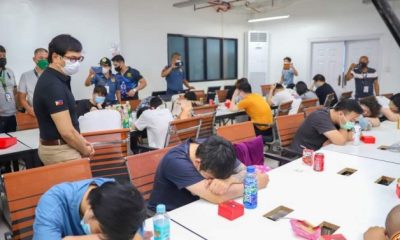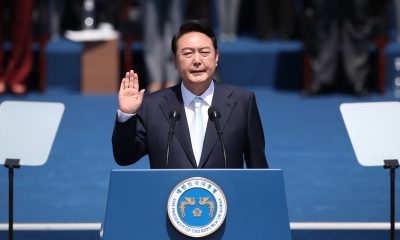Headline
Marcos signs 2025 nat’l budget, vetoes over P194-B in line items

2025 BUDGET. President Ferdinand R. Marcos Jr. signs the 2025 General Appropriations Act (GAA) on Monday (Dec. 30, 2024) in a ceremony in Malacañang. The President bared in his message that he has vetoed over PHP194 billion worth of line items in the budget deemed as inconsistent with his administration’s priorities. (PCO file Photo)
By Darryl John Esguerra, Philippine News Agency
MANILA – President Ferdinand R. Marcos Jr. on Monday signed into law the 2025 national budget and vetoed over PHP194 billion in line items he deemed inconsistent with his administration’s priorities.
In his speech, Marcos emphasized that the General Appropriations Act (GAA) 2025 was designed to sustain economic growth and improve the lives of future generations and should be carefully curated and scrutinized.
“We must exercise maximum prudence, or we risk increasing our deficit and debt, which could derail our development agenda,” Marcos said.
While the final version of the budget reflects many of the administration’s priorities, the President said certain provisions required “careful scrutiny” to ensure that every centavo is spent on programs that truly benefit the Filipino people.
“The Filipino people have spoken, and every centavo must go toward strengthening communities, uplifting lives, and securing the country’s future development,” he stated.
Marcos acknowledged that some had called for a veto of the entire budget and a return to a reenacted budget.
However, he emphasized that this would have set back vital programs and delayed the country’s economic goals, including achieving single-digit poverty levels and attaining upper-middle-income status.
“The Executive Branch is united with the people in raising concerns over allocations not aligned with the country’s development plan,” Marcos said.
“As stewards of taxpayers’ money, we take our responsibility seriously. After thorough review, we have vetoed over PHP194 billion worth of line items that are not consistent with our program priorities,” he added.
These cuts include certain projects under the Department of Public Works and Highways and an increase in unprogrammed appropriations by 300 percent.
The President also explained that the Ayuda sa Kapos ng Kita Program (AKAP) should be subjected to a convergence process involving the Department of Social Welfare and Development (DSWD), Department of Labor and Employment (DOLE), and National Economic and Development Authority (NEDA).
“This way, we ensure that its implementation will be strategic leading to the long-term improvement of the lives of qualified beneficiaries while guarding against misuse and duplication, and fragmented benefits,” he said.



























